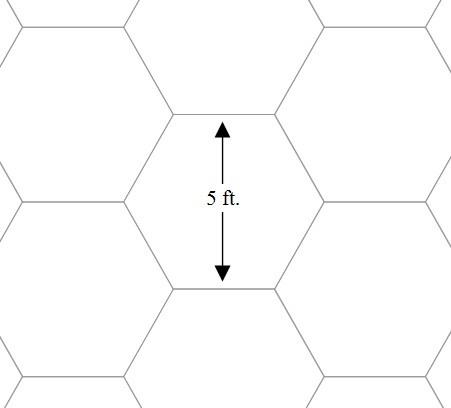Difference between revisions of "Combat Hex"
Tao alexis (talk | contribs) |
Tao alexis (talk | contribs) |
||
| Line 1: | Line 1: | ||
[[File:Combat Hex.jpg|right|280px]] | [[File:Combat Hex.jpg|right|280px]] | ||
| − | '''Combat Hexes''' are used when calculating movement during [[Combat|combat]]. Each hex has a diameter of 5 ft., which is "held" by combatants against opponents. With the exception of some rules related to [[ | + | '''Combat Hexes''' are used when calculating movement during [[Combat|combat]]. Each hex has a diameter of 5 ft., which is "held" by combatants against opponents. With the exception of some rules related to [[Charging|charging]], [[Grappling (hand-to-hand)|grappling]] and [[Overbearing|overbearing]], enemy combatants cannot enter a defender's hex unless that defender is reduced to [[Negative Hit Points|unconsciousness]], [[Death|killed]] or [[Stun Lock|forced back]]. |
All hexes immediately adjacent to a combatant's hex are subject to attack with most hand-held weapons. Pole-arms are able to attack two combat hexes away. Rules regarding the effect that a combatant has upon adjacent hexes is described under [[Melee|melee]]. For rules related to the number of combatants in a hex, see [[Multiple Defenders in One Hex|multiple defenders in one hex]] and [[Puissance (sage study)|puissance]]. For the number of hexes a combatant requires due to its size, see [[Size of Creatures|size of creatures]]. The effort to cross a combat hex during melee at a [[Movement (stride)|normal stride]] costs 1 [[Action Points|action point]]. | All hexes immediately adjacent to a combatant's hex are subject to attack with most hand-held weapons. Pole-arms are able to attack two combat hexes away. Rules regarding the effect that a combatant has upon adjacent hexes is described under [[Melee|melee]]. For rules related to the number of combatants in a hex, see [[Multiple Defenders in One Hex|multiple defenders in one hex]] and [[Puissance (sage study)|puissance]]. For the number of hexes a combatant requires due to its size, see [[Size of Creatures|size of creatures]]. The effort to cross a combat hex during melee at a [[Movement (stride)|normal stride]] costs 1 [[Action Points|action point]]. | ||
Revision as of 20:11, 11 August 2020
Combat Hexes are used when calculating movement during combat. Each hex has a diameter of 5 ft., which is "held" by combatants against opponents. With the exception of some rules related to charging, grappling and overbearing, enemy combatants cannot enter a defender's hex unless that defender is reduced to unconsciousness, killed or forced back.
All hexes immediately adjacent to a combatant's hex are subject to attack with most hand-held weapons. Pole-arms are able to attack two combat hexes away. Rules regarding the effect that a combatant has upon adjacent hexes is described under melee. For rules related to the number of combatants in a hex, see multiple defenders in one hex and puissance. For the number of hexes a combatant requires due to its size, see size of creatures. The effort to cross a combat hex during melee at a normal stride costs 1 action point.
See Also,
Movement in Combat
Ship Hexes
